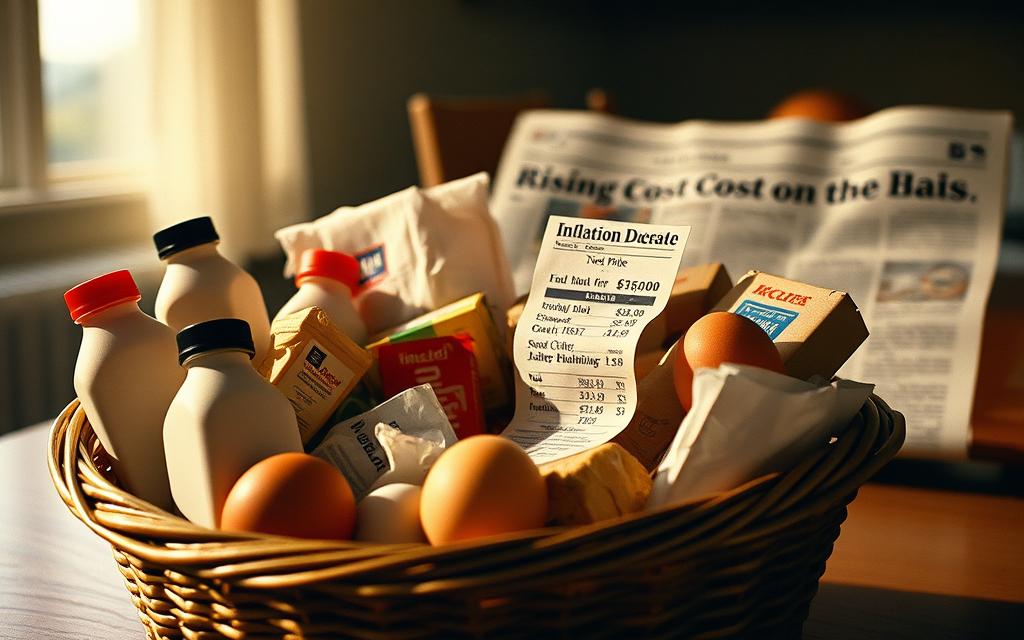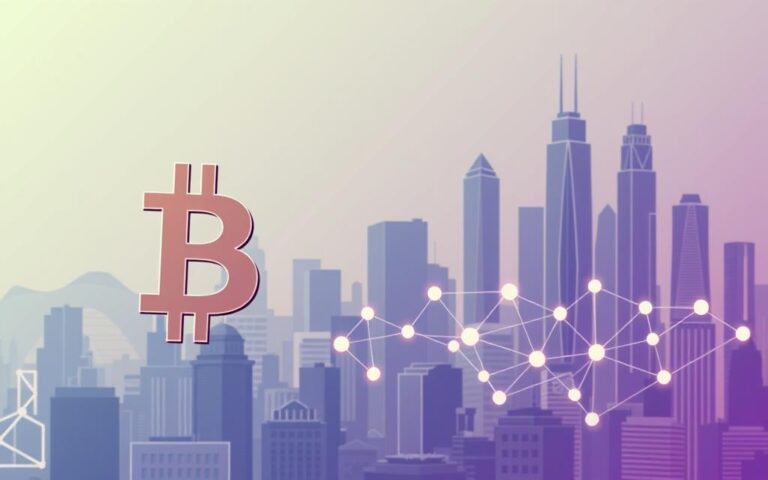In 2023, U.S. inflation hit its highest in over 40 years. Consumer prices went up by roughly 8% from the year before. This economic turmoil touches every part of American life. It changes how much we can buy and save.
The rising cost of living affects families, no matter their income. Knowing how these changes hit different people helps us deal with these tough times.
Understanding Inflation: A Brief Overview
Inflation is when prices for goods and services rise, reducing buying power. It affects families, companies, and government plans. Knowing about inflation helps understand its impact on the economy.
What is Inflation?
Inflation happens when more people want goods than what’s available, causing prices to go up. It’s driven by how much people spend, the cost to make goods, and government money rules. The Consumer Price Index (CPI) and Producer Price Index (PPI) measure these price changes. They help experts and policy makers track inflation and make plans to keep the economy steady.
Historical Context of Inflation in the U.S.
The U.S. has seen big inflation changes over the years that have shaped the economy. The 1970s oil crisis is one example, where inflation jumped because of high energy prices and global tensions. This time shows how oil prices, spending, and inflation are connected. Looking at past inflation helps us understand today’s trends and how to keep the economy safe.
How Inflation Affects Purchasing Power
Inflation makes it harder for American families to buy things because the value of money goes down. This means people have to spend more to live the same way as before. It shows why it’s important to think about how we use our money when everyday costs go up.
Declining Value of Money
Inflation means things cost more and your money buys less. This is really clear when you look at what you need every day. Things like food, clothes, and getting around cost more.
This makes it tough for families to keep their budgets or save money. Saving gets harder as the value of money drops, shaking up financial plans.
Impact on Everyday Expenses
Inflation touches every part of daily life. Groceries cost more, making it tough for families to eat well without spending too much. Costs for keeping a house warm or getting around have jumped too.
This increase makes people rethink how they spend their limited money. It affects life’s quality.
The Role of Interest Rates in Inflation
Interest rates are key in guiding the economy’s path. They link closely to inflation. Central banks change rates to manage inflation. They can affect how much people borrow, spend, and invest. This helps steer the economy’s direction.
Connection Between Inflation and Interest Rates
Inflation and interest rates affect each other. A rise in inflation often means higher interest rates. This can slow down borrowing, reducing spending and investment, which cools down inflation. On the flip side, low inflation leads to lower interest rates. This boosts economic activity. It shows how central banks shape economic health and growth.
How the Fed Responds to Inflation
The Fed’s goals are stable prices and full employment. To fight high inflation, it might raise interest rates. This makes borrowing more expensive, affecting budgets and savings. Knowing the Fed’s actions helps families prepare for financial shifts.
Inflation’s Impact on Housing Costs
Inflation greatly raises housing costs, especially rent and home prices. It has changed the housing market, challenging those looking for affordable options. Grasping these shifts helps us understand the difficulty of buying or renting homes today.
Rising Rent and Home Prices
Rent and home prices are soaring due to inflation. Landlords raise rents to cope, straining many families’ budgets. This situation is tough for low-income families and first-time buyers, limiting their options and financial flexibility.
Housing Market Trends During Inflationary Times
The housing market now shows the tough side of inflation. With high demand and not enough homes, prices have shot up. Buyers compete fiercely, often in bidding wars that push prices higher. This makes financial planning during uncertain times even more crucial.
Effects of Inflation on Essential Goods
Inflation impacts our lives, especially on necessities. Groceries and gas prices are climbing in the US. These changes make families rethink how they spend, affecting what they eat and how they get around.
Grocery Prices and Dietary Choices
Grocery costs are going up, changing what families can buy. Dairy, fruits, and veggies are getting pricier. People are choosing less expensive food or eating less. Knowing how inflation influences food costs can help with budgeting.
Gas Prices and Commuting Costs
Fuel costs greatly affect living expenses. With higher gas prices, people drive less or find other ways to travel. This shift alters how we commute, impacting jobs and leisure. The rise in everyday costs due to inflation pressures families, changing how they live and move.

Inflation and Employment
Inflation and employment are closely linked, creating challenges for workers and employers. Inflation impacts wage growth, affecting job chances and economic health. It’s important to grasp these relationships to understand the work scene today.
Wage Growth vs. Inflation
As prices rise, people often see their wages don’t match up with inflation. This makes it hard for workers to keep their way of life. Even if some sectors see higher wages, inflation usually wipes out those gains.
Thus, households spend more of their money on basic needs. This shows how deep inflation’s effects can go.
Job Market Challenges During Inflation
Inflation brings job market troubles, especially for the young and less-educated. Employers may not hire more, fearing higher costs. This can push unemployment up, hitting those just starting their careers hardest.
In such times, some job areas may shrink, making work even harder to find for those in need.
When inflation hits, it might slow down job creation. This is a big hurdle for everyone in the workforce. Knowing these issues can help people deal with the changing job landscape as prices rise.
The Psychological Effects of Inflation on Households
Inflation does more than just raise prices; it also touches the emotional health of families. As living costs go up, families feel the pinch in different ways. One big impact is how it shakes up the confidence of buyers, making it tough to decide on purchases.
Consumer Confidence and Spending Behavior
With prices going up, families become more careful with their money. They start to focus on must-haves and cut back on extra treats. This careful spending affects the whole economy, as it means less money goes to businesses, potentially threatening jobs.
Stress and Anxiety Related to Financial Uncertainty
The worry over money, caused by rising prices, can really stress families out. This stress can hurt relationships and make it hard to stay mentally healthy. The effort to keep up with costs in a shaky economy can drain a lot of emotional energy.
| Effect | Consumer Response | Psychological Impact |
|---|---|---|
| Increased Prices | Reduced discretionary spending | Heightened anxiety |
| Cost of Living Pressure | Prioritizing essentials | Financial stress |
| Financial Uncertainty | Increased savings | Long-term concerns |
Getting a grip on the mental effects of inflation can help us better handle the cost hikes. Paying attention to our emotional wellbeing is key, not just watching our wallets.
Inflation’s Influence on Savings and Investments
Inflation brings great challenges, especially regarding savings and investments. Prices go up, so the money you save loses its buying power over time. This situation forces people to think carefully about how to protect and increase their wealth.
Erosion of Savings Value
The impact of inflation on savings cannot be ignored. As things get more expensive, your savings buy less than before. Recent data shows inflation rates are higher than what savings accounts earn. This means people actually lose money. They must think smart about saving to avoid losing wealth due to inflation.
Investment Strategies During High Inflation
There are ways to fight the bad effects of inflation. Investing in real estate, commodities, or securities that guard against inflation can help. These choices can either hold their ground or grow in value when inflation is high. It’s crucial to spread investments across different areas to lower risk and beat inflation. Staying alert and adjusting your investment plan as the economy changes is key.
Coping Strategies for Households Facing Inflation
Households facing inflation deal with increased expenses in different areas. Adopting effective strategies can lessen the inflation impact. This allows families to keep their quality of life even during tough economic times.
Budgeting Tips for Rising Costs
To manage expenses in times of inflation, creating a budget is key. Here are important tips:
- Track Spending: Keep an eye on all expenses to see where you can cut back.
- Prioritize Needs Over Wants: Spend on what’s necessary and save non-essentials for later.
- Adjust Categories: Change your budget sections to reflect rising costs.
- Look for Discounts: Use coupons and sales for savings on needed goods.
Seeking Financial Advice and Resources
Getting advice from finance pros offers deep insights during inflation. Financial advisors and budget tools greatly help families manage inflation’s impact.
- Financial Planning Services: Talk to financial planners for advice suited to your family’s needs.
- Online Tools: Use apps for budgeting that track and adjust expenses.
- Community Resources: Check out local nonprofits for financial education and budgeting help.
The Future Outlook: What Lies Ahead for Inflation?
Looking ahead, it’s key for U.S. families to grasp inflation trends in our changing economy. It’s tough to predict inflation’s exact route, but economists paint several pictures based on policies and global markets. They foresee ups and downs caused by supply chain issues and new consumer habits after the pandemic, impacting inflation.
Predictions for Inflation Trends
Inflation could keep going up, hitting housing and daily needs hard. Experts believe rising energy costs and wages will push inflation higher. Families should keep an eye out, as this might tighten budgets and change how we plan our finances.
Preparing for Changing Economic Conditions
To handle economic inflation, families need flexible financial plans. It’s smart to save more, look into various investments, and check spending on must-haves. Staying ahead through financial education and being open to changes helps families face inflation’s challenges better.




